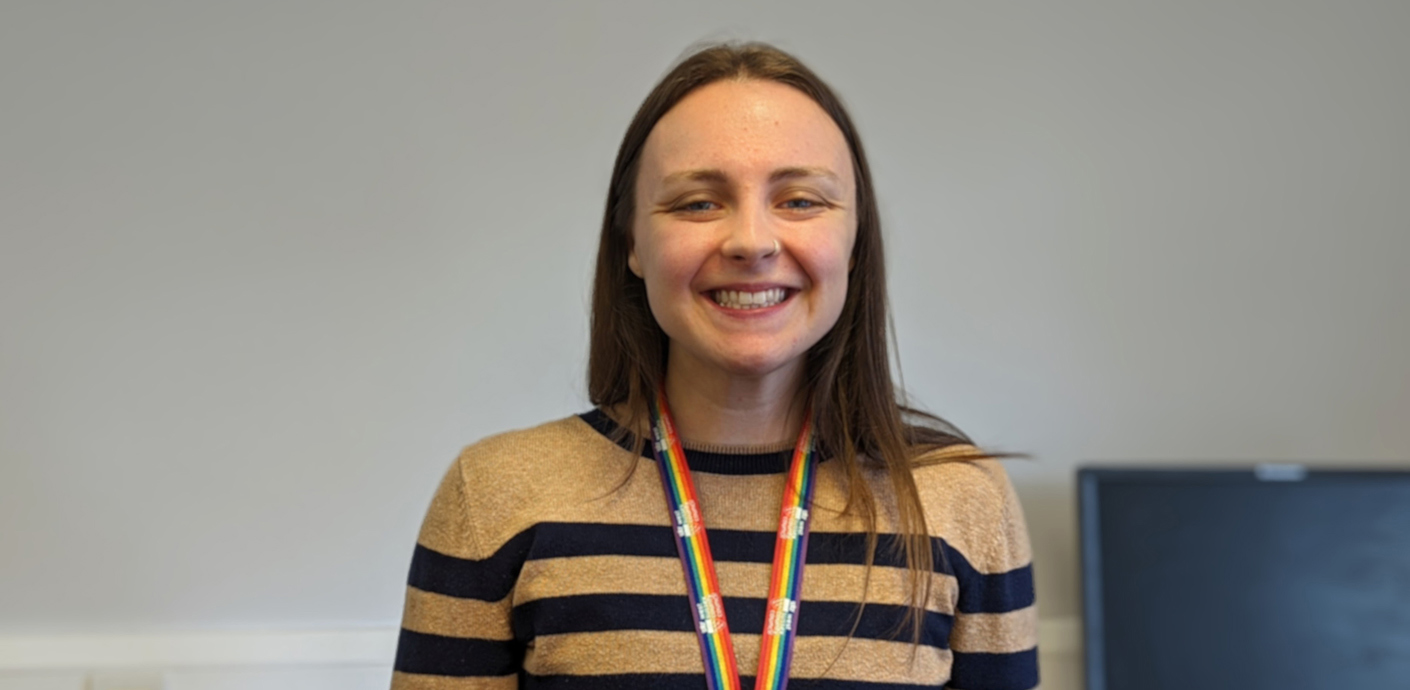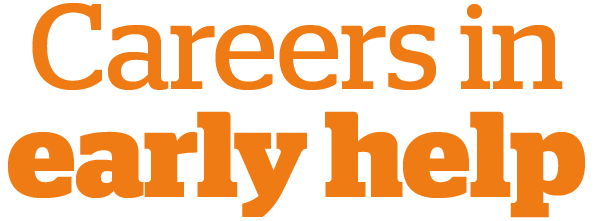Haley, Family Support Key Worker
An Early Help recruitment interview with Haley, Family Support Key Worker.

Can you tell me a little bit about yourself?
I'm Haley and I’m a family support keyworker for the Early Help service. I have worked in our service for almost three and a half years now. I'm an American and came to the UK to do my master’s degree in childhood and youth studies.
I just really enjoy being in the UK! The culture here around how we support children and how we work together to safeguard them was really interesting to me. The roles in the Early Help Service are actually, I think, pretty unique.
I've got experience in youth mental health, so I've worked in psychiatric facilities and things like that. What I like about this service is that it’s really the earliest intervention to be able to help. We try to work with the family at the right time to prevent things from escalating, but also to try to do that long term work where we can really build relationships with families. The support worker role is really unique in that sense.
In America there's not a lot of that kind of preventative intervention. It’s nice in the UK that there are these lovely centres and family hubs where families can access so much, just from that hub.
Is there anything else which inspired you to become family support keyworker?
Like I said before, a lot of my past experiences is in youth mental health, and we did a lot of the work primarily with young people and of course that's really important work. What really interests me in the role is working with the whole family. There might be five children, but one child is the one that we are particularly worried about. What I like about the role is that we go and meet with the other children too.
In hearing about what has impacted them, we also meet with the parents and we meet with the family altogether.
It was interesting to me that we would get to go into the family home, which I think is a real privilege to be able to do that. These families are allowing us in and showing us what their life is like. It was just interesting to me that we get to do that and that we're focusing on supporting with one concern or worry, but, through that, we get to see if anything else pops up and we get to manage that and support the family by working through problems. So, we might go in for a reason, but there's always something further that that comes up.
Prior to working in that role, I would focus on just mental health and just the one child and I wouldn't explore the whole environment as much as we do now. I was really drawn to this way of working.
Why did you choose to work for West Sussex County Council?
The answer to this is personally a logistical one for me, because to work here, I needed a visa, which is not a reason why a lot of people will be applying to work for the council, but the council does support with visas. Also, when I was doing my masters, I had friends who had worked for the council in other teams and they had talked about the benefits of working here. They had said really positive things about working for the council and so that's initially why I chose to look for jobs at WSCC.
Did you need any qualifications to work in your role or could you use transferable skills?
I think in terms of having experience working within the role, I didn't come into it with lots and lots of knowledge about families, or about young people under the age of 12. So, a lot of these things are things that I've learned through training with team members and just getting out there and doing the role.
I think that's the thing about this job, it touches on so many things that nobody can come into it from knowing every single bit of information. If you've got an associated skill, or a thing that you know quite a lot about, that just adds value to the team and then people can come to you and ask questions and you can learn from that. It’s a great learning environment.
What's the best thing about your job?
For me, the best thing about the job is the satisfaction or the confidence that comes with supporting a family through a difficult time and being able to close that Early Help plan and say “Wow, this family has made so many positive changes, they've really taken on board the advice and I got to be a part of that”.
I think for me it's about being able to build trust with people. The relationship building part of my job is really important to me because it allows families to know that I'm here for them. I'm not here to judge them, but I'm here to support them on their journey. I might just be a small part of it but that is a privilege to me.
I spend six months to a year sometimes with a family, so I think you build that close professional working relationship with them. They are building trust with you, and they see what you have to say has value and then that motivates them to want to make that change. Knowing that this is a collaborative process and they're allowing me into their home, I just think it's a really beautiful thing.
What do you particularly enjoy about working with in the Early Help team?
I enjoy that every day is different, but also every day is an opportunity to learn. You know there's lot of good training out there. Within our team we hold development days and there's always an opportunity to improve our practice.
I really like having the opportunity to be able to grow, also the people that Early Help attracts are typically people who really care about what they're doing and they care about families, so you're round just a lot of nurturing and kind people.
How does West Sussex County Council support you to develop and progress?
We have the learning and development team who put on frequent trainings about all sorts of different topics. We also work with partners, charities and agencies who offer training events, which is really nice because you are really relying on that network to learn. But, even just within our teams, we have team members who, if they've got a particular skill, host training and then we can learn from that too. We've got our team meetings as well.
In supervisions with your manager, we're able to reflect and talk about our goals as a worker and your manager can help support you with that.
Personally, I'm leading a portfolio as neglect champion for my hub, so, I go to meetings with other people around the county, who are also neglect champions and we learn more about how to implement our neglect strategy. We go back and we feed that information to our teams.
Is there a particular case or something about your work that makes you feel proud?
I was working with a family who didn't have a good relationship with the school. The school, I think, had been trying to support the family to make changes for a long time but the relationship between the school and the family wasn’t very good. The parent’s confidence was not very high and we kept having meetings where we were making decisions around concerns about their children, but things just weren't changing.
Then, the parents had a good idea; they said they were tired of being given actions that were telling them what they should do with their children, it wasn’t helping the relationships in the family.
I had been meeting with the children separately to gain their voices, but really what the parents were suggesting was to have meetings with them together. At first, we weren't sure how to make that happen, but we slowly brought the children in to meetings. We started with 5 minutes, then 10 minutes and eventually had it so that one child came for the first half and the other for the second half. The parents said that since having the children as a part of the process, so much had changed.
It was getting the perspective and the needs of the child heard, and then making that the driving force in the plans with the work that we were doing and showing the family how the children were picking up on these issues and worrying about this, then being able to relate that to what I've been talking about with the parents. I always feel really proud as I’m able to do that and get the parents to see actually, oh yes, we do need to make a change here.
What would you say the challenges are in your job?
I think something that I particularly find challenging, is probably the same across the board; having difficult conversations with families. It's hard and heart breaking to tell a family that they have been neglecting their child. I mean, of course we would put that in a positive way and say, look, this is what we can do about it. They've never had somebody come in and kind of challenge what they're saying or be a sounding board for them, and so sometimes that is really hard to do.
I think sometimes really exploring it with them and then having that deep conversation can be difficult if they're not receptive to hearing it. They may even withdraw their consent to continue, which can be hard as you're trying to do something that's positive for the family and you can see the future and the outcome, but they just can't see it yet.
If there was one myth you could bust about being a family support keyworker. What would it be?
I think I came into this role really intimidated by just having my one little piece of experience thinking, “Oh my gosh, how do I work with babies? How do I work with toddlers or with this or that?” And I've been doing it for three and a half years now, and I'm OK. I've made it.
I think what it is, is that you don't have to know everything, you don't have to have all the answers. That's the point of working as a team, you've got your stakeholders, you’ve got a partner in schools, your team within early help, your colleagues. You know there's all these people to help you and support you along the way.
What would you say to someone considering joining us in the Early Help team?
Do it. Try it out. It's a really good experience. It's challenging, it's not easy and I'm not going to pretend every single day is fulfilling. On the flip side, those challenges, once they're overcome, can be really rewarding. There's a lot of opportunity for growth here.
So, if you're looking for a job or a position that is going to challenge you and make you be a better person and improve your practice, then I think you should do it. This is the job for you.

